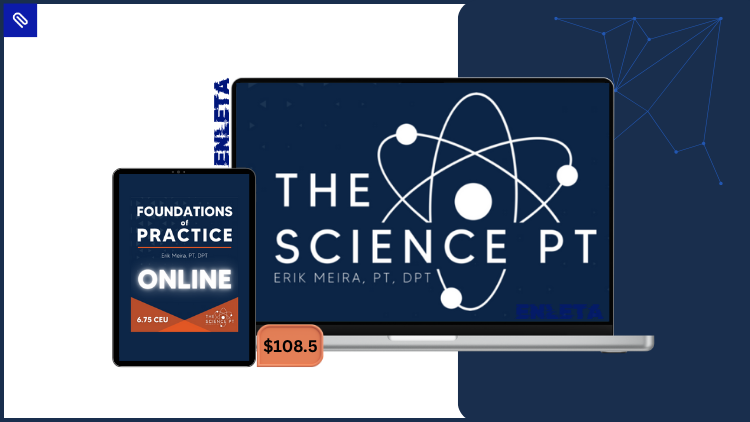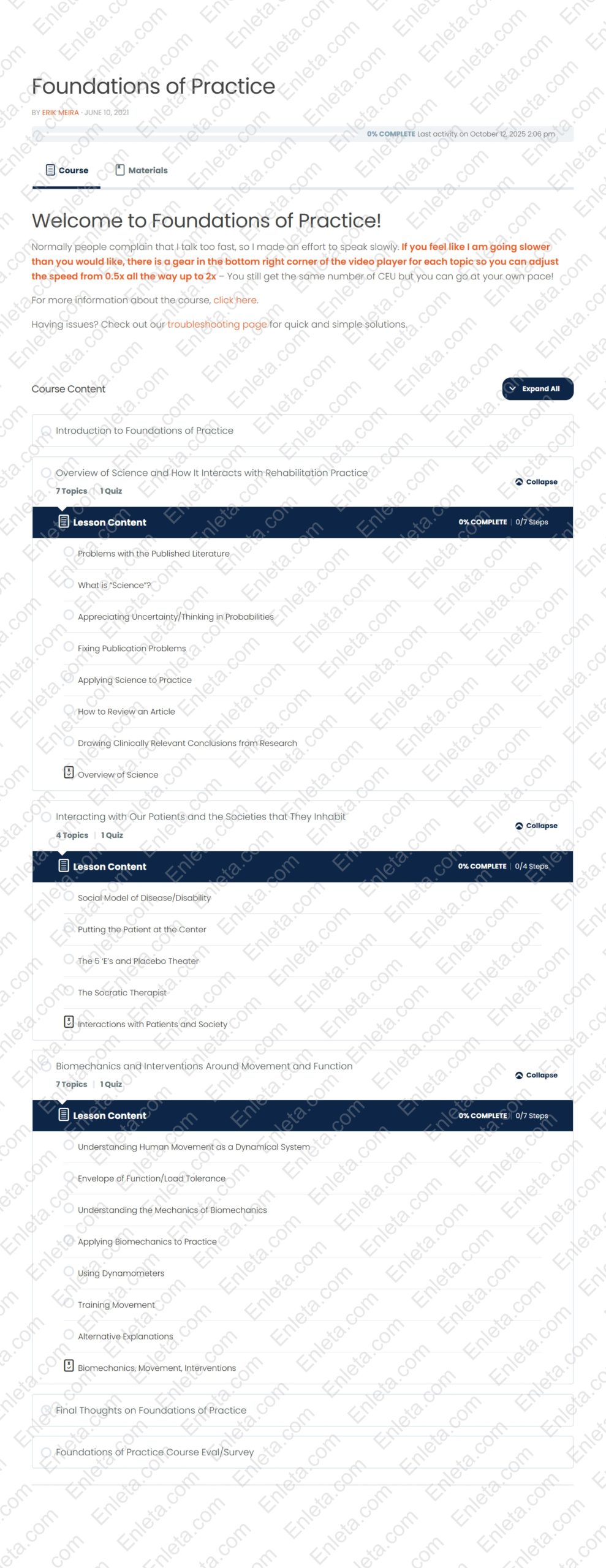Foundations of Practice – Evidence-Based Rehabilitation by Erik Meira | Digital Download!
Foundations of Practice by Erik Meira is an essential educational program designed to help rehabilitation professionals rethink how they approach patient care through the lens of science, psychology, and biomechanics. With a file size of 14.4 GB and priced at $108.5, this course presents a deep exploration of the core principles that define effective, evidence-based clinical practice in physical therapy and sports rehabilitation.
Foundations of Practice Free Download – Includes Verified Content:
Introduction to Foundations of Practice – Free Download Video Sample:
Foundations of Practice, Watch content proof here:
PDF Sample – Introduction-to-Foundations-of-Practice, watch here:
Course Overview
Built for Physical Therapists, PT Assistants, Athletic Trainers, and related professionals, this course provides a clear framework for integrating scientific reasoning, patient engagement, and biomechanics into everyday clinical decision-making.
Rather than focusing on isolated techniques, Erik Meira invites clinicians to think critically about the “why” behind interventions, helping them refine their judgment and enhance patient outcomes with clarity, simplicity, and confidence.
Why Choose This Course
In the fast-evolving world of rehabilitation medicine, it’s easy to get lost in conflicting theories, outdated paradigms, and anecdotal claims. Foundations of Practice cuts through the noise by teaching you how to evaluate evidence, apply critical thinking, and focus on what truly matters — effective, patient-centered care.
Key reasons to take this course:
-
Learn how to think like a scientist in a clinical environment.
-
Simplify your approach by understanding the real mechanisms behind interventions.
-
Develop stronger clinical reasoning grounded in logic and evidence.
-
Engage patients more effectively through psychology and communication principles.
-
Enhance biomechanical understanding to improve movement, load tolerance, and rehabilitation outcomes.
This course provides not just information, but a mindset shift — helping you transition from technician to thoughtful, science-driven clinician.
What You’ll Learn
The Foundations of Practice course is divided into three major thematic areas: science and evidence, human interaction, and biomechanics — all integrated to create a unified approach to rehabilitation.
1. Science and Practice
Gain a practical understanding of how research and evidence shape modern rehabilitation.
-
Identify problems and biases in published literature.
-
Understand what “science” really means in clinical context.
-
Learn how to review and interpret studies for real-world application.
-
Think in probabilities rather than absolutes to better manage uncertainty.
2. Patients and Society
Explore how patients’ beliefs, psychology, and social environments affect recovery.
-
Understand the social model of disease and disability.
-
Learn to apply Socratic communication to uncover patient motivations.
-
Master the 5 E’s of patient interaction: Empathy, Education, Empowerment, Encouragement, and Engagement.
-
Discover how to balance scientific rigor with compassion and trust-building.
3. Biomechanics, Movement, and Interventions
Understand movement as a dynamic system influenced by load, tolerance, and adaptability.
-
Learn the concept of Envelope of Function and how to apply it clinically.
-
Differentiate between peak force, rate of force development, and impulse.
-
Use dynamometers and other tools to assess performance and progress.
-
Explore alternative explanations for why interventions work.
-
Apply biomechanics directly to your treatment plans with practical strategies.
Course Curriculum
-
Introduction to Science and Practice
-
Problems in the Published Literature
-
Fixing Publication Problems
-
Applying Science to Clinical Work
-
How to Review an Article
-
Social Model of Disease and Disability
-
The Socratic Therapist Approach
-
Biomechanics and Human Movement
-
Envelope of Function and Load Tolerance
-
Using Dynamometers and Functional Testing
-
Training Movement and Intervention Design
-
Alternative Explanations and Critical Thinking
-
Final Reflections
Duration: 14+ hours
Format: Modular video lectures (theory + application)
Access: Lifetime, self-paced learning
Who Should Take This Course
This program is ideal for:
-
Physical Therapists and Assistants looking to deepen their clinical reasoning.
-
Athletic Trainers seeking to merge biomechanics and evidence-based principles.
-
Sports Rehabilitation Specialists aiming to refine treatment precision.
-
Students and new graduates who want to build a solid conceptual foundation for practice.
-
Experienced clinicians searching for a scientific and practical framework to simplify decision-making.
No prior specialization is required — the course adapts to all levels of experience.
Benefits of Joining
-
Think Critically – Strengthen your ability to evaluate research and challenge assumptions.
-
Simplify Complexity – Translate science and biomechanics into clear clinical actions.
-
Improve Patient Relationships – Engage, educate, and empower with evidence-informed communication.
-
Enhance Movement Analysis – Master applied biomechanics and load management.
-
Build Lasting Confidence – Gain a deeper understanding of the science behind your practice.
About the Instructor
Erik Meira, PT, DPT, is a Board-Certified Sports Clinical Specialist and Certified Strength and Conditioning Specialist renowned for his contributions to sports rehabilitation, biomechanics, and science-based education.
He serves as Director of the Physical Therapy Science Communication Group in Portland, Oregon, and is a clinical advisor for the University of Portland NCAA Division I program. His consulting experience spans professional organizations such as the NBA, NFL, MLS, and NCAA, where he has helped optimize athlete recovery and performance.
A gifted educator known for his humor and clarity, Dr. Meira lectures internationally on applied biomechanics, exercise prescription, return-to-sport principles, and clinical reasoning. He is also co-host of PT Inquest, a podcast dedicated to interpreting rehabilitation science.
Course Summary
The Foundations of Practice by Erik Meira offers a transformative approach to modern rehabilitation. By uniting scientific literacy, clinical reasoning, and biomechanical understanding, this course equips clinicians to provide smarter, simpler, and more effective care.
Whether you’re treating elite athletes or everyday patients, this course will challenge your assumptions, strengthen your scientific foundation, and elevate your professional practice.
👉👉Build your foundation for clinical excellence — enroll now in Foundations of Practice by Erik Meira and start transforming how you think, reason, and treat.











Reviews
There are no reviews yet.